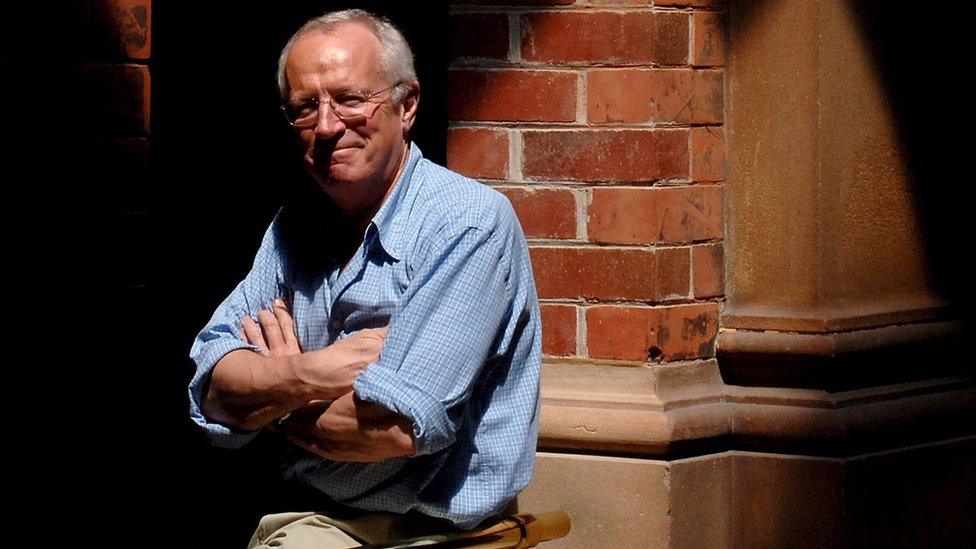Robert Fisk, veteran UK journalist, dies aged 74
- Published

Robert Fisk was best known for his coverage of the Middle East, where he began reporting from in the 1970s
Veteran foreign correspondent Robert Fisk has died of a suspected stroke at the age of 74.
He had been admitted to St Vincent's Hospital in Dublin after falling ill at his home on Friday, and died shortly afterwards, the Irish Times reported.
Fisk won numerous awards for his reporting on the Middle East, starting from the 1970s.
But he also drew controversy for his sharp criticism of the US and Israel, and of Western foreign policy.
Covering wars in the Balkans, Middle East and North Africa for UK newspapers over five decades, Fisk was described by the New York Times,, external in 2005, as "probably the most famous foreign correspondent in Britain".
Born in Maidstone, Kent in 1946, he later took Irish citizenship and had a home in Dalkey outside the capital Dublin.
Irish President Michael D Higgins has expressed his "great sadness" about Fisk's death on Sunday.
"With his passing the world of journalism and informed commentary on the Middle East has lost one of its finest commentators," he said in a statement, external.
Allow X content?
This article contains content provided by X. We ask for your permission before anything is loaded, as they may be using cookies and other technologies. You may want to read X’s cookie policy, external and privacy policy, external before accepting. To view this content choose ‘accept and continue’.

After starting his career at the Sunday Express, Fisk moved to Belfast in 1972 to cover the Troubles as Northern Ireland correspondent for the Times. He became the paper's Middle East correspondent in 1976.
Based in Beirut, he reported on the civil war in Lebanon, as well as the Iranian Revolution in 1979, the Soviet war in Afghanistan and the Iran-Iraq War.
He resigned from the Times in 1989 after a dispute with the owner Rupert Murdoch and moved to the Independent, where he worked for the remainder of his career.
In the 1990s he interviewed Osama Bin Laden three times for the paper. He described him as a "shy man" and looking "every inch the mountain warrior of mujahedin legend" in their first interview in 1993, external.

'Gutsy and admired'

Robert Fisk was brave and controversial. He was a brilliant writer, who did his best work in wars, transporting readers to his side in some burning village. He relished making enemies, especially if they defended US or Israeli activities in the Middle East.
Fisk could be obsessive. He collected bits of shrapnel, often American made and fired by Israel, so he could use serial numbers to trace their origins.
When I visited Beirut from Jerusalem in the 1990s he served me gin and tonics on his balcony overlooking the Mediterranean in a Yasser Arafat souvenir glass. Robert was old school. He poked fun at the flak jacket I brought to Lebanon from the former Yugoslavia, sniffing it to check for slivovitza plum brandy.
Journalism can be a dog-eat-dog trade. Fisk's colleagues were not always kind about his work. I was an admirer, eating up his vivid reportage from Beirut when I was at school, and was awestruck when first I met him. I'll miss Robert, his guts and his appetite for the fight, even though usually he followed a warm hello with some crack about the evils of television news or the BBC.

After the 11 September attacks plotted by Bin Laden, Fisk, an Arabic speaker, spent the next two decades covering conflicts throughout the Middle East, including in Afghanistan, Iraq and Syria.
He was highly regarded for his knowledge of, and deep experience in, the region, and often dismissed journalists who sat behind desks instead of venturing out into the field.
But he also drew criticism for his attacks on Western policy in the Middle East and was accused of being lenient towards the Syrian government in his reporting of the country's long and brutal civil war.
Articles by Fisk about the US and Israel were often considered highly controversial. He said the Trump administration's acceptance in 2019 of Israel's annexation of the occupied Syrian Golan Heights showed Israel had effectively annexed the US, external, and repeatedly accused Israel of committing war crimes against the Palestinians.
In 2011 Fisk was forced to apologise after the Independent was successfully sued by the then-Saudi interior minister over a report that alleged the minister had ordered police to shoot and kill unarmed protesters, based on a document which turned out to be fake.
Fisk married US journalist Lara Marlowe in 1994 but the pair divorced in 2006. He had no children.